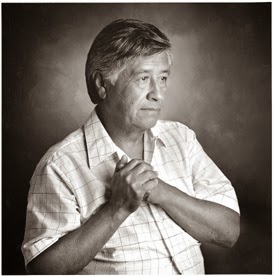-
To celebrate César E. Chávez
(and the movement for farm-workers' rights, justice, and peace)
the eulogy written on the occasion of his death.
(and the movement for farm-workers' rights, justice, and peace)
the eulogy written on the occasion of his death.
---------A fines de abril
-------------------------a César E. Chávez
A fines de abril
las viñas ya verdes de brotos,
llegó la muerte al campesino,
al césar de las uvas vestidas de azul,
de las cebollas de fondos blancos,
de las manzanas de vestiduras rojas.
-----Le dijo — ¡Vén, César! —
Y se lo llevó de las uvas envenenadas,
las sandías, los melones llenos de mal,
de las batallas de los surcos,
de las emboscadas de las acequias,
del estandarte guadalupano,
de la bandera roja y negra.
Pero en los surcos
su voz dejó sembrado
su anhelo por justicia —
---que es decir reclamar
--------el pan para el hambre
--------el alivio para el enfermo
--------los libros para el inocente.
Su voz dará fruto
---y habrá regocijo
------en los surcos,
------las acequias,
------las mesas,
------la tierra.
-----------© Rafael Jesús González 2014
(Siete escritores comprometidos: obra y perfil; Fausto Avendaño, director;
Explicación de Textos Literarios vol. 34 anejo 1; diciembre 2007;
Dept. of Foreign Languages; California State University Sacramento;
derechos reservados del autor.)
Hoy, 21 años después, la promesa y la esperanza no ha dado fruto; los trabajadoes del campo están en aun peores condiciones que cuando César Chávez empezo su lucha. Ya no hay sindicato de que hablar ni lo ha habido por años como Marshall Ganz, amigo y socio de Chávez ha notado. Tenemos que aprender de los éxitos de César tanto como de sus faltas también. La lucha for la justicia en los campos sigue.
On March 10th, 1968, César Chávez breaks his 25-day fast
by accepting bread from Senator Robert Kennedy, Delano, California
----------At the End of April
------------------------to César E. Chávez
At the end of April
the vines already green with buds,
death came to the field-worker,
to the caesar of the grapes dressed in blue,
of the onions in white petticoats,
of the apples in red vestments.
-----She said to him, “Come, César!”
And took him from the poisoned grapes,
the watermelons, the melons full of ill,
the battles of the furrows,
the ambushes of the ditches,
the Guadalupe standard,
the red and black flag.
But in the furrows
his voice left planted
his longing for justice —
----which is to say, his demands
-----------for bread for the hungry,
-----------healing for the sick,
-----------books for the innocent.
His voice will bear fruit
-----and there will be rejoicing
----------in the furrows,
----------in the ditches,
----------round the tables
----------in the land.
----------© Rafael Jesús González 2014
Today, 21 years after, the promise and hope has not borne fruit; farm workers are in even worse condition than when César Chávez’s struggle began. There is no union to speak of any more, nor has there been for years as Marshall Ganz, friend and associate of Chávez, has noted. We must learn from César's success and from his failures as well. The struggle for justice in the fields goes on.




No comments:
Post a Comment